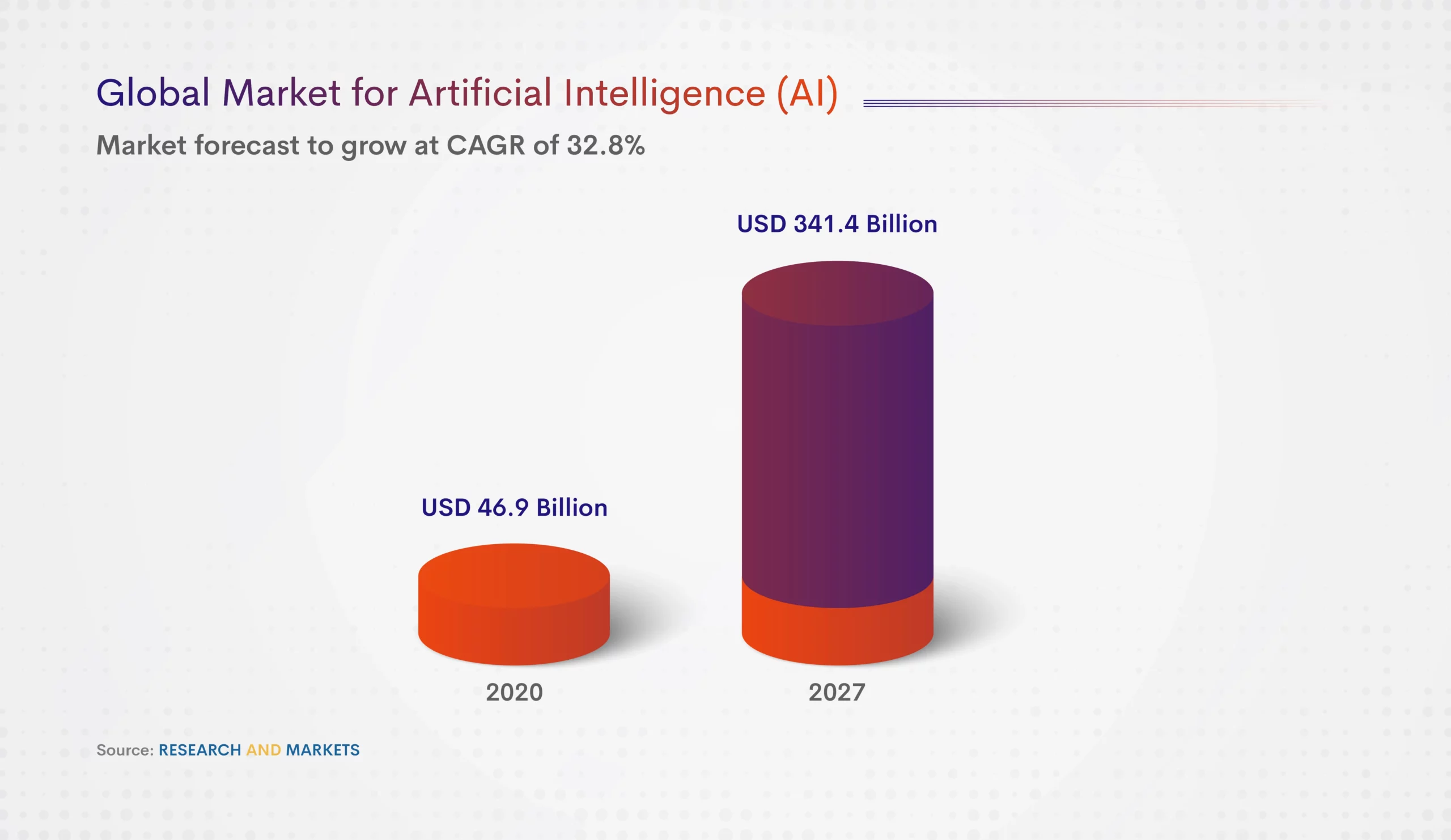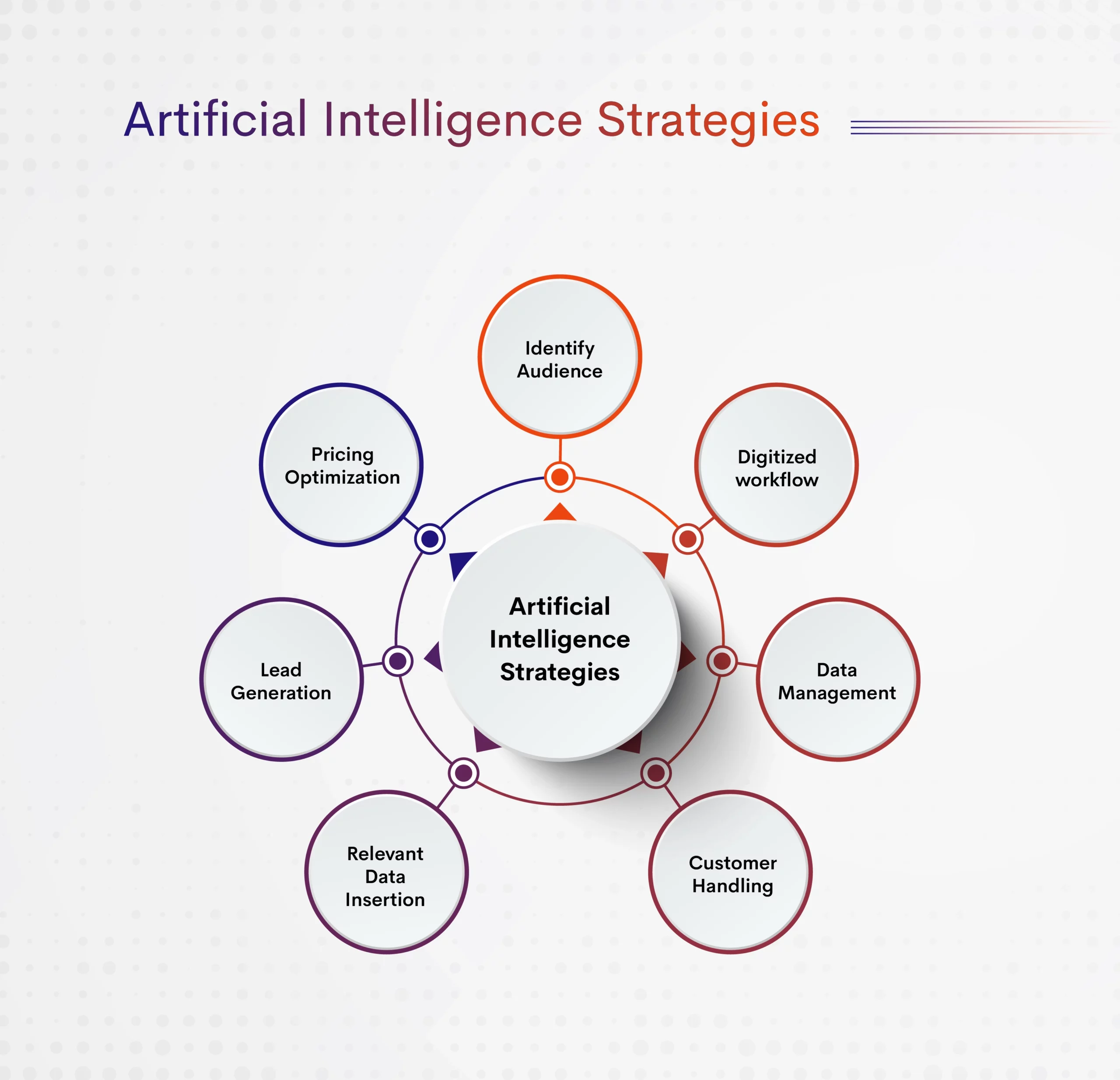- Blog
- October 11, 2022
Eight critical AI strategies to boost your business

- Blog
- October 11, 2022
Eight critical AI strategies to boost your business
Business applications for AI are virtually limitless as it develops to imitate human intelligence in robots. It is becoming increasingly obvious that enterprises are primarily utilising AI to replace humans and save dollars as AI-based technologies (such as data analytics and robotics) gain traction. There are endless potential for businesses to use AI. The majority of labor work is now performed by machines using AI led innovation. A $341.4 billion market for artificial intelligence (AI) is anticipated by 2027 as businesses speed up their plans for digital transformation.

Businesses employ AI to do monotonous work and maintain their competitiveness. AI, which uses computer algorithms to replicate human intelligence processes, is already used by sales organizations to boost sales and grow their operations.
Eight critical AI strategies to boost your business
No AI strategy is the same, yet they all need to tackle the same issues. Any AI strategy is the holy trinity of Data, Infrastructure, and Algorithms. Let’s understand each strategy in detail.

- Identify your audience: When using AI in their business, companies should consider the software tools that will make it easier to engage with target customers and reach the ultimate goals. Marketers must use AI technology to help them better segment their customer base, foster greater consumer connection, and implement dynamic content strategies if they want to stay one step ahead of the competition.
- Digitized workflow: The majority of workflows include manual tasks, which are frequently expensive, time-consuming, and error-prone. Tasks, like hiring, accounting, delivering services, and many more are essential to the workflow and hence have an immediate effect on the time consumption, expense, and level of the entire procedure. These manual operations in the workflow can be made better by implementing AI. Processes are streamlined, accelerated, and made more effective, which results in higher achievement in less time.
- Data management:AI’s capabilities can support analytics efforts and allow businesses to internalize data-driven decision-making while facilitating simple data handling for all employees. As a result, data analysts, data scientists, engineers, and other data professionals can spend less time on monotonous manual tasks and benefit from the democratization of data across the company.
- Customer handling:
Enables your customers to use a single way to resolve even their most complicated problems via voice or digital channels. AI can collaborate with human support staff to solve routine tasks, freeing them up to handle more complicated issues. Without the help of human agents, AI technologies like chatbots can quickly identify voice triggers and offer pertinent information and direction. - Relevant data insertion:
AI systems are becoming more and more dominant in modern life. Data operations spanning from data cleaning and wrangling through model creation are typically included in the sequential approach to data processing used in AI model development. The type, volume, and quality of inserted data determine how accurate an algorithm will be, which has resulted in a strong reliance on AI. - Lead generation:
All over the world, small- and large-business owners work to keep up with the modern marketing trends, which change quickly. AI offers tremendous returns on investment for businesses. Utilizing this potential will allow you to work harder while still staying within your budget because of the obvious financial advantages. Market Research Future predicted that by 2030, the market for AI in marketing would be worth more than USD 48.8 billion and increase at a CAGR of 28.6%. (MRFR) - Pricing optimization:
Pricing optimization is one of the critical decisions a company must make in order to compete in a fiercely competitive market. Prices are changing rapidly. As a result, manually tracking the movements and subsequently changing your own prices is not viable. If used appropriately, AI can be a valuable tool to achieve a number of corporate goals, such as profit maximization, demand management, value generation, etc. An AI-based price optimization algorithm accurately predicts what your customers will spend. - Personalization of content:
AI now makes mass personalization of content possible. The visitor is considerably more interested in reading the content and interacting with businesses. Following a personalized shopping experience, 60% of consumers polled by Twilio stated customers are making another purchase from the same brand. Make use of AI to comprehend, categorize, and sort your content. Utilize this well-organized database to create recommendations, that are highly specific to each visitor.
Final words:
When Artificial intelligence is utilized only as an experiment and a specific problem is not identified, or no plan is prepared, it will prove to be a fruitless endeavor, and management will not see a return on investment. So, it’s time to determine your market positioning after you understand what your items will accomplish and whom they will serve. AI has gained the capability to fundamentally disrupt a market by spawning cutting-edge new services and brand-new economic paradigms.
MSRcosmos help customers in devising contextual AI strategies to conquer digital ambitions. Our AI services coupled with matured data and analytics solutions help you stay ahead in today’s hyper digitized world. Connect with our experts today.




